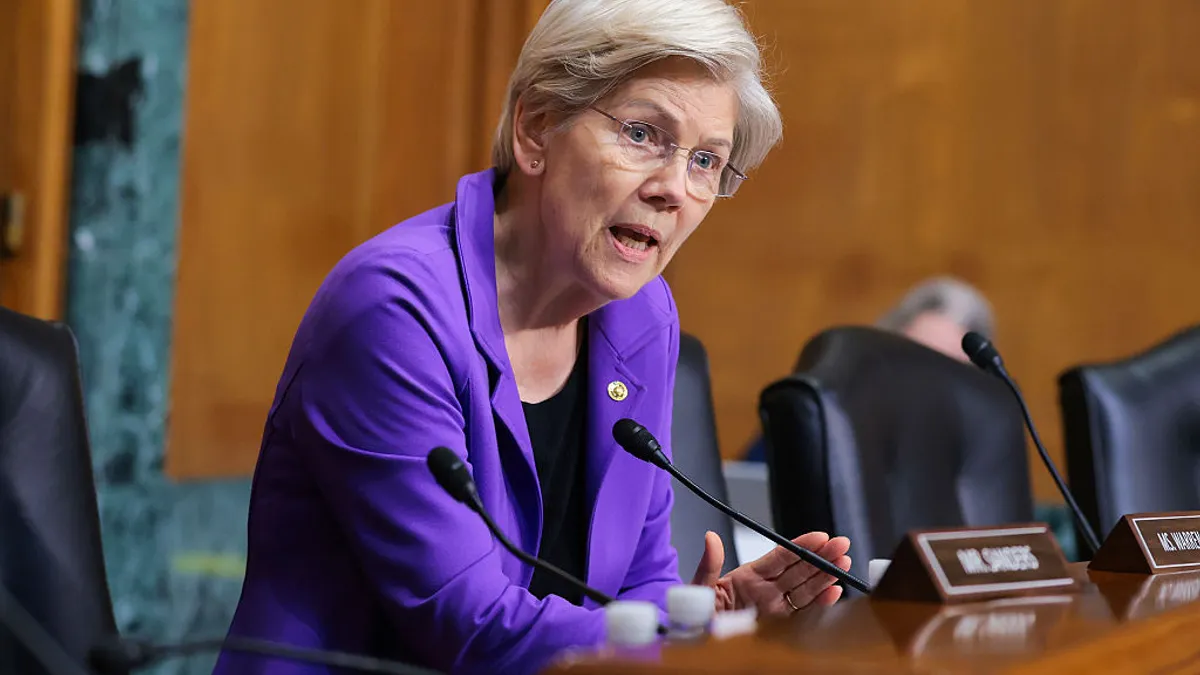The Small Business Administration has long been a proponent of fintechs extending 7(a) loans, a stance that has drawn criticism from certain Republican quarters. The lifting of the 40-year moratorium on nondepository small business development companies last year has provided advocates with an expanded opportunity to pursue this endeavor.
This move has opened the door for fintechs to potentially play a more significant role in the 7(a) loan landscape — a development that the SBA has encouraged.
However, last week, SBA Administrator Isabel Guzman was questioned by Sen. Joni Ernst, R-IA, on President Joe Biden’s funding request, with Ernst urging Guzman to fix the agency’s major issues before asking for more taxpayer money.
“Administrator Guzman, you are here today asking for more money to fund an agency that is actively failing to respond adequately to numerous inquiries from Congress, actively failing to track fraud in its programs, and whose offices are often deserted,” Ernst said at the hearing.
Ernst, a ranking member of the Senate’s Small Business and Entrepreneurship Committee, questioned Guzman on the SBA’s decision to give financial technology companies access to a key SBA lending program.
Ernst highlighted the SBA’s first license given to London-based Funding Circle claiming its CEO, Lisa Jacobs, stated that the company does not have enough capital to start making loans early next month and plans to sell the license soon. She also said Funding Circle received an investment from a Beijing-based fintech conglomerate, according to reports.
“Based on the SBA’s recent track record, I have zero confidence in the agency to do proper due diligence on [Small Business Lending Companies] risk and protect programs from [Chinese Communist Party] influence. I join my colleagues in demanding the administration rein in its reckless lending rules and stop issuing new licenses like the one they issued to China-affiliated Funding Circle,” Ernst noted.
Funding Circle, for its part, refuted the claims.
"Funding Circle is not affiliated with or partially owned by any Chinese-owned entity," Ryan Metcalf, head of public affairs for Funding Circle U.S., told Banking Dive via email, adding that the company provided evidence in a letter to Congress/SBA showing its most recent share register as analyzed by an independent third party.
In the letter — to Sen. Jeanne Shaheen, D-NH; Rep. Roger Williams, R-TX; Nydia Velazquez, D-NY; and Ernst, with Guzman also in the loop — Funding Circle said it sought to “address and clarify, for the record, inaccurate and misleading statements made at the hearings about the Funding Circle group.”
Guzman, to the House and Senate committees, has defended extending the loan program’s access to nonwhites and underserved communities. She also noted her renewed push for direct lending authority, highlighting Biden’s fiscal 2025 budget plan, which also includes it.
“We don't want to compete with our lenders,” Guzman said. “We want our lenders to be able to do these loans; that's why we've tried to simplify as much as we can to transform our programs and underwriting processes. But we do need to fill these capital gaps for entrepreneurship to continue to thrive and we are looking forward to working with Congress on a positive solution for direct lending and continuing to fill the gaps.”
In an email to Banking Dive, Funding Circle said it is “in the process of finalising outstanding lender oversight requirements and are preparing to begin lending once those are complete.”
Funding Circle does not intend and has never “intended to immediately turn around and sell the license” or “use it as a bargaining chip,” the company said. The fintech also clarified that it is well-capitalized to prepare to expand its product offering to include 7(a) loans under $500,000 once the SBA gives the green light to the pending lender oversight requirements.
The fintech has loaned over $4.5 billion to 45,000 small businesses in the U.S. since 2013, the letter noted.
Its U.S. counterpart intends to continue executing its plan to originate SBA 7(a) loans to underserved businesses across the country including Puerto Rico, according to Metcalf.
“Funding Circle has received expressions of interest in our U.S. business and those conversations are at an early stage. However, our intention is that any transaction regarding the U.S. business would be to a well capitalised U.S. domiciled entity willing to provide the capital to enable Funding Circle US to continue executing our business plan submitted to the SBA,” he noted.
Fintechs and the SBA 7(a) loan program
There are only 17 licenses available for now, with the addition of Arkansas Capital Corporation, Alaska Growth Capital BIDCO, Inc., and Funding Circle last year.
However, according to Metcalf, the speed and complexity of the program's operation have made it less economically appealing for companies to participate in it.
“SBA 7(a) requires an on balance sheet model which requires significantly more capital than the primary ‘Fintech’ marketplace/off balance sheet models,” while requiring significant investment to fit a lending program around 7(a), he said
“The new rules by SBA known as ‘Do what you do’ significantly reduce that burden but there are still SBA specific processes and requirements that you have to account for,” Metcalf added.
Many organizations are advocating for expanding the SBA 7(a) rule to nonbanking entities, including fintechs, so that businesses can benefit from the innovative tools and technology that come with it.
“Fintech has long been a lifeline for small businesses, filling a gap in access to capital left by traditional banks, particularly for underserved communities,” Financial Technology Association President and CEO Penny Lee said in a statement to Banking Dive. “With robust compliance and risk controls coupled with appropriate oversight, fintech participation in the SBA 7(a) lending program is poised to accelerate innovation and ensure small businesses across the country can benefit from tools and technologies they require to access capital.”





















